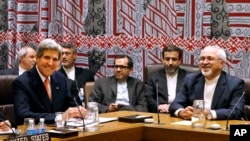U.S. Secretary of State John Kerry will caution lawmakers Wednesday against imposing new sanctions against Iran while international negotiations over its nuclear program continue.
Kerry is scheduled to brief the Senate banking committee. State Department spokeswoman Jen Psaki said he will express that enacting new sanctions at this time would be a mistake.
"The right step is to put a temporary pause on sanctions. It doesn't mean we can't put them in place in the future. [U.S. negotiators are] not eliminating that. This is simply a pause to see if this negotiating process can work its way through," explained Psaki.
Officials from both Iran and the P5+1 group that includes the United States, Britain, France, China, Russia and Germany have expressed optimism about their latest round of negotiations, despite failing so far to agree on a deal. The talks will continue next week.
Iran is seeking an easing of sanctions as part of any deal, but some U.S. lawmakers are pushing instead to impose further measures.
In an opinion piece published Tuesday in USA Today, Senate Foreign Relations Committee chairman Bob Menendez wrote, "tougher sanctions will serve as an incentive for Iran to verifiably dismantle its nuclear weapons program. When Iran complies, sanctions can be unwound and economic relief will follow."
Meanwhile, Iranian officials say inspectors from the United Nations could be allowed inside Iran's new heavy water nuclear reactor within weeks as part of a separate deal with the U.N. nuclear agency.
The spokesman for Iran's nuclear department tells the official IRNA news agency Tehran is willing to grant the U.N. International Atomic Energy Agency access to its Arak reactor before the next round of talks with the agency, which will begin December 11.
However, Behrouz Kamalvandi also pointed out that details of such an inspection still need to be worked out.
Iran and the IAEA signed an agreement that will allow expanded inspections of Iran's nuclear sites.
Iran insists its nuclear program has always been designed for peaceful purposes.
Kerry is scheduled to brief the Senate banking committee. State Department spokeswoman Jen Psaki said he will express that enacting new sanctions at this time would be a mistake.
"The right step is to put a temporary pause on sanctions. It doesn't mean we can't put them in place in the future. [U.S. negotiators are] not eliminating that. This is simply a pause to see if this negotiating process can work its way through," explained Psaki.
Officials from both Iran and the P5+1 group that includes the United States, Britain, France, China, Russia and Germany have expressed optimism about their latest round of negotiations, despite failing so far to agree on a deal. The talks will continue next week.
Iran is seeking an easing of sanctions as part of any deal, but some U.S. lawmakers are pushing instead to impose further measures.
In an opinion piece published Tuesday in USA Today, Senate Foreign Relations Committee chairman Bob Menendez wrote, "tougher sanctions will serve as an incentive for Iran to verifiably dismantle its nuclear weapons program. When Iran complies, sanctions can be unwound and economic relief will follow."
The spokesman for Iran's nuclear department tells the official IRNA news agency Tehran is willing to grant the U.N. International Atomic Energy Agency access to its Arak reactor before the next round of talks with the agency, which will begin December 11.
However, Behrouz Kamalvandi also pointed out that details of such an inspection still need to be worked out.
Iran and the IAEA signed an agreement that will allow expanded inspections of Iran's nuclear sites.
Iran insists its nuclear program has always been designed for peaceful purposes.






